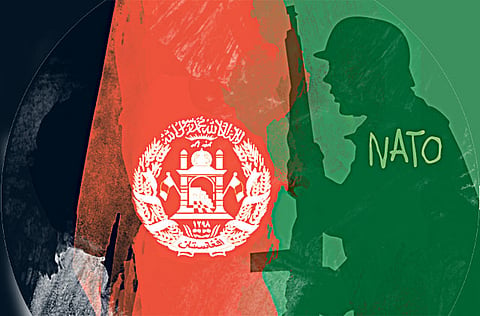Underestimating a clash of values
It is surprising that Nato commanders have not indoctrinated their soldiers to respect religious sensibilities of Afghans

The incineration by Nato troops of copies of the Quran two weeks ago led to violent protests in Afghanistan, protests in Pakistan as well as condemnation in other Muslim countries. At least 30 Afghans have been killed, and six American soldiers, two of them officers in the supposedly secure Afghan Interior Ministry, while others have been wounded. US President Barack Obama sent a letter of apology for this unintended act but the protests have not abated.
What does this development signify about: Muslim sensibilities; the mindset of the Nato commanders and soldiers; what has been achieved in the 10 years of occupation of Afghanistan; and what it portends for the future as the Nato forces wind down and prepare to largely leave by 2014. For Muslims the Quran is divine revelation and each Quran sacrosanct, thus no attempt to desecrate this holy book verbally or physically can be tolerated.
It is therefore surprising that Nato commanders have not indoctrinated their soldiers to respect the deeply held religious sensibilities and customs of the Afghans. Their proclaimed mission is to protect and assist. After September 11, Islamophobia has taken hold. At the operational level faced with growing unpopularity and armed resistance, Afghans are often viewed as the enemy by Nato foot soldiers. The widely resented special operations night raids to kill or capture Taliban leaders and to degrade their cadres and morale, with no respect for the traditional sanctity of Afghan homes, further desensitise Nato troops.
That the Taliban are making the most of these protests is obvious. However what has not been analysed is the role played by Afghan internal politics. It took a few days for President Hamid Karzai to call for an end to violence. Observers believe that he has used if not orchestrated the situation to reiterate that 2014 is too soon for the Nato/Isaf forces to leave, that Afghanistan needs continuing and massive support, and that his government must be central in the peace talks begun between the US and the Taliban.
Surprisingly, most protests have taken place in the territory of the Northern Alliance. This partly demonstrates that in the run up to 2014 the northern leaders are trying to reassert their relevance. Also, that dissatisfaction with the occupation has penetrated the north once seen as a pro-West bastion. The security official who killed the two American officers in the Interior Ministry was a northerner.
There are now re-assessments in America due to the growing unpopularity of this enterprise and a shocked American public, with Republican presidential candidates criticising Obama for his apology. Earlier troop drawdowns are being discussed to leave behind a security infrastructure and institutions capable of preserving some of the gains, containing or better still co-opting the Taliban and above all averting a slide-back to the chaos which occurred in the aftermath of the Soviet withdrawal. That all American and other Nato countries' advisers have been pulled back from Afghan ministries, even if temporary, does not bode well for the capacity-building still required.
Reconciliation
It is not that this clash of values signifies a sudden tectonic shift. Rather it has forced recognition of the ever-present underlying reality. If relatively developed Iraq could not be remade in the neo-con image of a modern democratic pro-western regional model, attempting to fundamentally change deeply tribal, conservative and decentralised Afghanistan was a far more impractical ambition. The ability of the US to negotiate a long-term strategic agreement to maintain a presence after 2014 when combat troops leave, which it failed to do in Iraq, now seems less likely. Overall the imprint of western occupation remains tenuous.
The objective of making the world safer from terrorism and extremism has not worked. Al Qaida has been weakened but sprung up phoenix-like elsewhere and terrorism and extremism have grown as direct results of the occupations of Afghanistan and Iraq.
The international community and the regional countries, particularly Pakistan hardest hit by the fallout from Afghanistan are keen for an internal Afghan reconciliation. However the American strategy of fighting to degrade the Taliban and to try to negotiate with them at the same time complicates the situation.The Taliban are biding their time.
The continuing volatility unfortunately points to all Afghan parties professing to be ready to talk but preparing to settle the outcome by force of arms. The prognosis for Afghanistan and the region remains bleak. History will recognise and record that the decade-long occupation was a mistake, and its objectives were far more achievable by other means.
Ambassador Tariq Osman Hyder is a former Pakistani diplomat.


